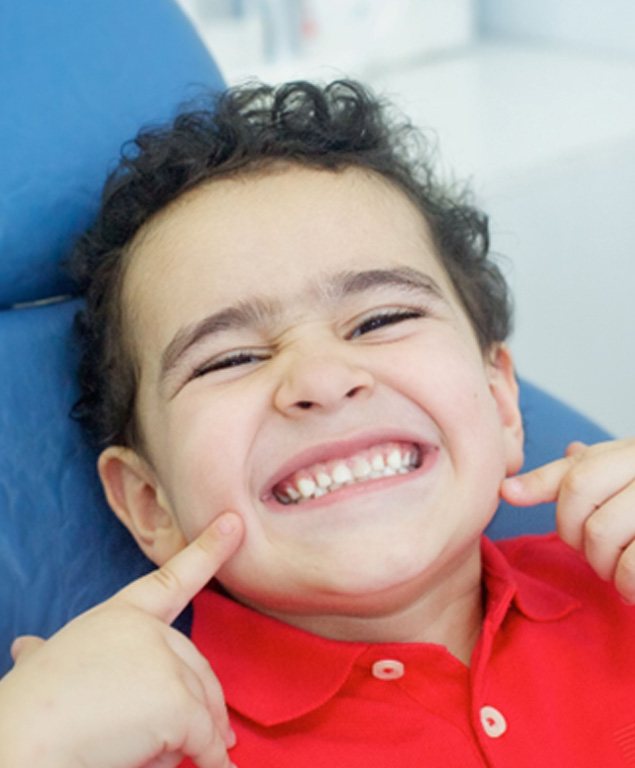Children’s Dentistry Cambridge
Trusted Dental Care for Your Favorite Smile
Just like adults, children need regular dental care in order to ensure that their smiles remain beautiful and healthy. It’s essential that you bring your little one to an expert who knows how to keep children as calm and comfortable as possible in the dental chair. Our team at Harbor Dental Center can refer you to a trusted pediatric dentist in Cambridge so that your child can get the quality treatment that they deserve.
What Does a Children’s Dentist Do?

It should be noted that our office does not have a children’s dentist on staff. As such, if you are looking for a dental practice to take the youngest members of your family to, we will refer you out.
Children's dentists fulfill many important functions pertaining to a child’s overall oral health and hygiene. They place particular emphasis on the proper maintenance and care of deciduous (baby) teeth, which are instrumental in facilitating good chewing habits, proper speech production, and holding space for permanent teeth. Other important functions of children's dentistry include:
Education
Pediatric dentists educate the child using models, computer technology, and child-friendly terminology, thus emphasizing the importance of keeping teeth strong and healthy. In addition, they advise parents on disease prevention, trauma prevention, good eating habits, and other aspects of the home dental hygiene routine.
Monitoring Growth
By continuously tracking growth and development, pediatric dentists are able to anticipate dental issues and quickly intervene before they worsen. Also, working towards earlier corrective treatment preserves the child’s self-esteem and fosters a more positive self-image.
Prevention
Helping parents and children establish sound eating and oral care habits reduces the chances of later tooth decay. In addition to providing checkups and dental cleanings, pediatric dentists are also able to apply dental sealants and topical fluoride to young teeth, advise parents on thumb-sucking/pacifier cessation, and provide good demonstrations of brushing and flossing.
Intervention
In some cases, pediatric dentists may discuss the possibility of early oral treatments with parents. In the case of oral injury, malocclusion (bad bite), or bruxism (grinding), space maintainers may be fitted, a nighttime mouth guard may be recommended, or reconstructive surgery may be scheduled.
How Can I Prepare My Child for Their First Dental Visit?

Pediatric dentists are required to undergo extensive training in child psychology. Their dental offices are generally colorful and child-friendly, and they often boast a selection of games, toys, and educational tools. Pediatric dentists (and their dental staff) aim to make the child feel as welcome as possible during all visits. There are several things parents can do to make a child’s first dental visit in Cambridge enjoyable. Some helpful tips are listed below:
Take another adult along for the visit
Sometimes infants become fussy when having their mouths examined. Having another adult along to soothe the infant allows the parent to ask questions and to attend to any advice the dentist may have.
Leave other children at home
Other children can distract the parent and cause the infant to fuss. Leaving other children at home (when possible) makes the first dental visit less stressful for all concerned.
Avoid threatening language
Pediatric dentists and staff are trained to avoid the use of threatening language like “drills,” “needles,” “injections,” and “bleeding.” It is imperative for parents to use positive language when speaking about dental treatment with their child.
Provide positive explanations
It is important to explain the purposes of the dental visit in a positive way. Explaining that the dentist “helps keep teeth healthy” is far better than explaining that the dentist “is checking for cavities and might have to drill the tooth if decay is found.”
Explain what will happen
Anxiety can be vastly reduced if the child knows what to expect. Age-appropriate books about visiting the dentist can be very helpful in making the visit seem fun. Here is a list of parent and dentist-approved books:
- The Berenstain Bears Visit the Dentist – by Stan and Jan Berenstain.
- Show Me Your Smile: A Visit to the Dentist – Part of the “Dora the Explorer” series.
- Going to the Dentist – by Anne Civardi.
- Elmo Visits the Dentist – Part of the “Sesame Street” series.
How Can I Help My Child Avoid Cavities?

Biannual visits with the children's dentist are only part of the battle against cavities. Here are some helpful guidelines for how to prevent cavities in Cambridge:
Analyze your child’s diet
Too many sugary or starchy snacks can expedite cavity formation. Replace sugary snacks like candy with natural foods where possible, and similarly, replace soda with water.
Cut the snacks
Snacking too frequently can unnecessarily expose teeth to sugars. Save the sugar and starch for mealtimes, when the child is producing more saliva. Make sure they consume enough water regularly to cleanse the teeth.
Lose the sippy cup
Sippy cups are thought to cause “baby bottle tooth decay” when they are used beyond the intended age (approximately twelve months). The small amount of liquid emitted with each sip causes sugary liquid to continually swill around the teeth.
Avoid stickiness
Sticky foods (like toffee) form plaque quickly and are extremely difficult to pry off the teeth. Avoid them when possible.
Rinse the pacifier
Oral bacteria can be transmitted from mother or father to baby. Rinse a dirty pacifier with running water as opposed to sucking on it to avoid contaminating the baby’s mouth.
Drinks at bedtime
Sending a child to bed with a bottle or sippy cup is bad news. The milk, formula, juice, or sweetened water basically sits on the teeth all night, attacking enamel and maximizing the risk of cavities. Ensure the child has a last drink before bedtime, and then brush the teeth.
Don’t sweeten the pacifier
Parents sometimes dip pacifiers in honey to calm a cranky child. Do not be tempted to do this. Use a blanket, toy, or hug to calm the child instead.
Brush and floss
Parents should brush and floss their child’s teeth twice each day until the child reaches the age of seven years old. Before this time, children struggle to brush every area of the mouth effectively.
Check on fluoride
When used correctly, fluoride can strengthen tooth enamel and help stave off cavities. Too much or too little fluoride can actually harm the teeth, so ask the pediatric dentist for a fluoride assessment.
Keep to appointments
The child’s first dental visit should be scheduled around his or her first birthday, as per the American Academy of Pediatric Dentistry (AAPD) guidelines. Keep to a regular appointment schedule to create healthy smiles!
How Can Thumb Sucking and Pacifier Sucking Damage Teeth?

Pacifier sucking and thumb sucking can be quite insidious. The damage from both can be difficult to assess with the naked eye, and both tend to occur over a prolonged period of time. Below is an overview of some of the risks associated with prolonged thumb sucking and pacifier use:
Jaw misalignment
Pacifiers come in a wide range of shapes and sizes, most of which are completely unnatural for the mouth to hold. Over time, pacifiers and thumbs can guide the developing jaws out of the correct alignment.
Tooth decay
Many parents attempt to soothe infants by dipping pacifiers in honey or some other sugary substance. Oral bacteria feed on sugar and emit harmful acids. The acids attack tooth enamel and can lead to pediatric tooth decay and childhood caries.
Roof narrowing
The structures in the mouth are extremely pliable during childhood. Prolonged, repeated exposure to thumb and pacifier sucking can actually cause the roof of the mouth to narrow (as if molding around the sucking device). This can cause later problems with developing teeth.
Slanting teeth
Pacifier sucking and thumb sucking can cause growing teeth to slant or protrude, leading to poor esthetic results. In addition, thumb sucking and pacifier use in later childhood can both increase the need for extensive orthodontic treatments.
Mouth sores
Passive sucking is much less harmful than aggressive sucking. Aggressive sucking (characterized by popping sounds when the child sucks) may cause sores or ulcers to develop.
How Can Athletic Mouthguards Protect My Child?

The majority of sporting organizations now require participants to routinely wear mouthguards. Though mouthguards are primarily designed to protect the teeth, they can also vastly reduce the degree of force transmitted from a trauma impact point (jaw) to the central nervous system (base of the brain). In this way, mouthguards help minimize the risk of traumatic brain injury, which is especially important for younger children. Mouthguards also reduce the prevalence of the following injuries:
- Cheek lesions
- Concussions
- Gum and soft tissue injuries
- Jawbone fractures
- Lip lesions
- Neck injuries
- Tongue lesions
- Tooth fractures
Here is an overview of the advantages and disadvantages of each type of mouthguard:
Stock mouthguards
These mouthguards can be bought directly off the shelf and immediately fitted for the child’s mouth. The fit is universal (one-size-fits-all), meaning that the mouth guard doesn’t adjust. Stock mouthguards are very cheap, easy to fit, and quick to locate at sporting goods stores. Pediatric dentists favor this type of mouth guard least, as it provides minimal protection, obstructs proper breathing and speaking, and tends to be uncomfortable.
Boil and bite mouthguards
These mouthguards are usually made from thermoplastic and are easily located at most sporting goods stores. First, the thermoplastic must be immersed in hot water to make it pliable, and then it must be pressed on the child’s teeth to create a custom mold. Boil and bite mouthguards are slightly more expensive than stock mouthguards, but they also tend to offer more protection, feel more comfortable in the mouth, and allow for easy speech production and breathing.
Customized mouthguards
These mouthguards offer the greatest degree of protection and are custom-made by a dentist. First, the dentist makes an impression of the child’s teeth using special material, and then the mouthguards are constructed over the mold. Customized mouthguards tend to be a little more expensive and take longer to fit, but they are more comfortable, orthodontically correct, and come with the full approval of a dentist.
